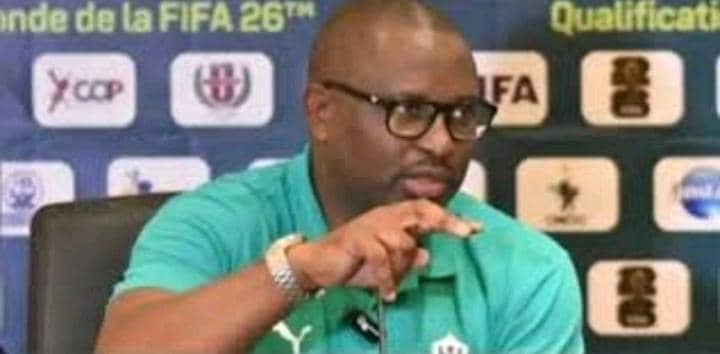Gabon head coach Thierry Mouyouma admitted his side fell short after a 4-1 loss to Nigeria in the 2026 FIFA World Cup playoff semi-final on Thursday night.
The match, played at the Prince Héritier Moulay El Hassan Sports Complex in Rabat, saw the Panthers of Gabon compete valiantly but ultimately succumb to the attacking firepower of the Super Eagles in extra time.
Gabon started the match with hope, looking to upset one of Africa’s top footballing nations. Jerome Akor opened the scoring for Nigeria early on, putting Gabon on the back foot.
Despite the early setback, Gabon showed resilience. Mario Lemina equalised in the 89th minute, giving the team and fans renewed belief that an upset could be on the cards. The match was finely poised at 1-1 heading into extra time, with Gabon having matched Nigeria in periods of intensity and tactical discipline.
However, extra time exposed Gabon’s defensive fragility. Nigeria capitalised through substitute Chidera Ejuke, who restored the lead early in extra time. Victor Osimhen then scored twice, sealing a comprehensive 4-1 victory for the Super Eagles. What had been a competitive contest during normal time became a harsh lesson in extra time for Mouyouma’s side.
After the match, Mouyouma admitted the Panthers had not performed at the required level. “We were not good enough,” he said. “We were not sharp enough in the offensive box, and we didn’t defend well in our defensive box. Nigeria did both and scored.”
Despite the heavy scoreline, Mouyouma argued the result did not reflect Gabon’s competitiveness for most of the match. “The match was decided on fine margins. The scoreline doesn’t show how well we competed against one of the most dangerous attacking sides in Africa,” he added. Gabon created chances and matched Nigeria physically and tactically at several points, but the inability to cope with the high tempo and individual quality of Nigeria’s forwards proved decisive.
Players such as Lemina showcased leadership and composure, while Denis Bouanga and Aaron Boupendza attempted to stretch Nigeria’s defence whenever possible. Yet the gaps in Gabon’s defensive organisation were ruthlessly exploited in extra time, leaving the coach frustrated but determined to focus on the future.
With World Cup qualification now out of reach, Gabon must redirect attention to the 2025 Africa Cup of Nations (AFCON), which will take place in Morocco in December. Mouyouma stressed the importance of using the experience as motivation for the continental tournament. “It is painful that our dream of reaching the continental playoff is over,” he said. “But we will learn from this and regroup for AFCON.”
Gabon’s campaign highlighted both their potential and limitations. While their attacking play displayed flashes of creativity and skill, defensive lapses and inability to maintain consistency under pressure remain areas for improvement. AFCON presents an opportunity to address these weaknesses and build a team capable of competing with Africa’s best sides over a sustained tournament.
For Nigeria, Thursday’s victory reinforced their status as one of Africa’s leading teams and showcased the depth of talent within their squad. For Gabon, it is a chance to rebuild and prepare for the next major test. Mouyouma’s candid reflections and acknowledgment of the team’s shortcomings signal a realistic approach to development ahead of AFCON.
As Gabon regroup, their focus will be on blending experience with emerging talent, ensuring lessons from the defeat to Nigeria are translated into stronger performances on the continental stage. The 4-1 loss may have ended their World Cup dream, but it is also the beginning of a journey to reclaim respect and competitiveness in African football.
Gabon’s path to AFCON promises challenges, but with Mouyouma at the helm, the team has a clear plan: learn from mistakes, build resilience, and aim to compete at the highest level.



